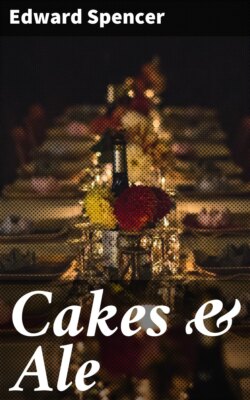Читать книгу Cakes & Ale - Spencer Edward - Страница 29
На сайте Литреса книга снята с продажи.
A Mediterranean Breakfast
Оглавлениеis not lacking in poetry; and the jaded denizen of Malta can enjoy red mullet (the “woodcock of the sea”) freshly taken from the tideless ocean, and strawberries in perfection, at his first meal, whilst seated, maybe, next to some dreamy-eyed houri, who coos soft nothings into his ear, at intervals. The wines of Italy go best with this sort of repast, which is generally eaten with “spoons.”
In fair France, breakfast, or the déjeûner à la fourchette, is not served until noon, or thereabouts. Coffee or chocolate, with fancy bread and butter, is on hand as soon as you wake; and I have heard that for the roisterer and the p’tit crevé there be such liquors as cognac, curaçoa, and chartreuse verte provided at the first meal, so that nerves can be strung together and headaches alleviated before the “associated” breakfast at midday. In the country, at the château of Monsieur et Madame, the groom-of-the-chambers, or maître d’hôtel, as he is designated, knocks at your bedroom door at about 8.30.
“Who’s there?”
“Good-morning, M’sieu. Will M’sieu partake of the chocolat, or of the café-au-lait, or of the tea?”
Upon ordinary occasions, M’sieu will partake of the chocolat—if he be of French extraction; whilst the English visitor will partake of the café-au-lait—tea-making in France being still in its infancy. And if M’sieu has gazed too long on the wine of the country, overnight, he will occasionally—reprobate that he is—partake instead of the vieux cognac, diluted from the syphon. And M’sieu never sees his host or hostess till the “assembly” sounds for the midday meal.
I have alluded, just above, to French tea-making. There was a time when tea, with our lively neighbours, was as scarce a commodity as snakes in Iceland or rum punch in Holloway Castle. Then the thin end of the wedge was introduced, and the English visitor was invited to partake of a cup of what was called (by courtesy) thé, which had been concocted expressly for her or him. And tea à la Française used to be made somewhat after this fashion. The cup was half-filled with milk, sugar à discrétion being added. A little silver sieve was next placed over the cup, and from a jug sufficient hot water, in which had been previously left to soak some half-dozen leaf-fragments of green tea, to fill the cup, was poured forth. In fact the visitor was invited to drink a very nasty compound indeed, something like the “wish” tea with which the school-mistress used to regale her victims—milk and water, and “wish-you-may-get” tea! But they have changed all that across the Channel, and five o’clock tea is one of the most fashionable functions of the day, with the beau monde; a favourite invitation of the society belle of the fin de siècle being: “Voulex-vous fivoclocquer avec moi?”
The déjeûner usually begins with a consommé, a thin, clear, soup, not quite adapted to stave off the pangs of hunger by itself, but grateful enough by way of a commencement. Then follows an array of dishes containing fish and fowl of sorts, with the inevitable côtelettes à la somebody-or-other, not forgetting an omelette—a mess which the French cook alone knows how to concoct to perfection. The meal is usually washed down with some sort of claret; and a subsequent café, with the accustomed chasse; whilst the welcome cigarette is not “defended,” even in the mansions of the great.
There is more than one way of making coffee, that of the lodging-house “general,” and of the street-stall dispenser, during the small hours, being amongst the least commendable. Without posing as an infallible manufacturer of the refreshing (though indigestible, to many people) beverage, I would urge that it be made from freshly-roasted seed, ground just before wanted. Then heat the ground coffee in the oven, and place upon the perforated bottom of the upper compartment of a cafetière, put the strainer on it, and pour in boiling water, gradually. “The Duke” in Geneviève de Brabant used to warble as part of a song in praise of tea—
And ’tis also most important
That you should not spare the tea.
So is it of equal importance that you should not spare the coffee. There are more elaborate ways of making coffee; but none that the writer has tried are in front of the old cafetière, if the simple directions given above be carried out in their entirety.
As in France, sojourners (for their sins) in the burning plains of Ind have their first breakfast, or chota hazri, at an early hour, whilst the breakfast proper—usually described in Lower Bengal, Madras, and Bombay as “tiffin”—comes later on. For
